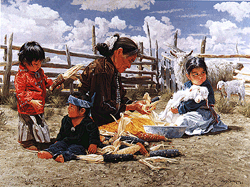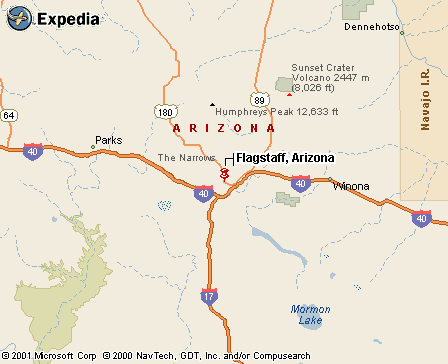|
|
Canku Ota |
|
|
(Many Paths) |
||
|
An Online Newsletter Celebrating Native America |
||
|
June 5, 2004 - Issue 114 |
||
|
|
||
|
Navajo Elders Give 150,000 Hours to Nation |
||
|
by George Joe/Special to The Farmington Daily Times |
||
|
“Thank you for volunteering. You really deserve this respect and we are all very proud of you,” said Anslem Roanhorse Jr., executive director of the Navajo Division of Health, who addressed 195 elders who volunteer over 150,000 hours this past year. The recognition ceremony is an annual event. “You truly are the fabric of our nation,” added U.S. Rep. Rick Renzi, R-Ariz., a guest speaker. The Navajo Foster Grandparents program, a program under the Navajo Area Agency on Aging office within the Navajo Division of Health, is one of only four programs within the state of Arizona, but with a volunteer rate that is 3-4 times higher than other Arizona projects. The program falls under the senior corp program of Corporation for National Service, a federally funded national program with 30,000 volunteer throughout the U.S. Elders who are part of the program work 20 hours a week and paid a small stipend for travel. The Navajo Nation joined the program in 1971, but the program initially began in the mid 1960s under the ACTION program. “The Navajo Nation Foster Grandparents program is a model program in Indian country,” said Lenny Teh, a program official with the Save the Children foundation. Carole Mandino, who has spent 20 years working with senior volunteers throughout northern Arizona, believes the high volunteer rate within the Navajo Nation is due to the culture. “It is entrenched in Navajo culture,” said Mandino, senior program coordinator for Northern Arizona University’s Gerontology Institute. “There have been so many generations of volunteers on Navajo, that it has become part of the culture. She said elders are respected on Navajo “They have better relationship with children, then off-reservation people. They are the knowledge of the people and are an untapped resource,” said Mandino. There’s an estimated 20,000 tribal members age 60 years on up across the reservation. Elders said they enjoy volunteering because it makes them feel good. “When I go into a cafeteria, they are all shouting, Grandma! Grandma! said Laura Desh, 64, a foster grandparent from Tuba City. “It is a good feeling...Everybody then turns around and looks. They’re like baby lambs crying out.” Irene Eldridge, program director, said her staff works with local schools and Headstarts to place grandparents in the community. At their site, they teach the kids, one-on-one the Navajo language and culture and help with reading, and even adjusting to school life. “Last year, a state official recognized that some children even had improved their reading skills with the help of the grandparents,” she said. A common concern among foster grandparents is the loss of the Navajo language and culture. “Today’s kids are losing their culture and language,” added Irene Franklin, another foster grandparent from Leupp. “When we first meet them (kids) we tell them who they are and where they come from. Some are slow and some don’t want to listen. They are all different.” Eldrige said the foster grandparents make a big difference by mentoring and teaching Navajo culture to the kids. “All of them are very concerned about the loss of our language and culture,” she said. “This is why many of them sign up to volunteer. It’s common for some volunteers to have been with the program for 15 - 30 years, said Victoria Bahe, program staff with the Fort Defiance office. In recent years, however, officials said recruiting has become harder, because the stipend is not enough in these days of rising gas prices. They are hoping that they can get additional funding. Presently, the project is funded $558,489 by the Corporation for National Service. The Navajo Nation then kicks in $200,000, and the State of New Mexico helps with $99,392. Arizona provides no financial support. To become a foster grandparent, an applicant must be 60 years of age, meet certain income eligibility requirements, love children, and be willing to volunteer 20 hours a week, said Bahe. Participants earn a small, tax-free stipend to cover the cost of serving. They also receive reimbursements for transportation, meals while on duty, annual physical examination, and supplemental accident and liability coverage while serving. Information:
(928) 871-6868. |
|
|
www.expedia.com |
|
|
||
|
|
||
| Canku Ota is a free Newsletter celebrating Native America, its traditions and accomplishments . We do not provide subscriber or visitor names to anyone. Some articles presented in Canku Ota may contain copyright material. We have received appropriate permissions for republishing any articles. Material appearing here is distributed without profit or monetary gain to those who have expressed an interest. This is in accordance with Title 17 U.S.C. Section 107. | ||
|
Canku Ota is a copyright © 2000, 2001, 2002, 2003, 2004 of Vicki Barry and Paul Barry. |
||
 |
 |
|
|
The "Canku Ota - A Newsletter Celebrating Native America" web site and its design is the |
||
|
Copyright © 1999, 2000, 2001, 2002, 2003, 2004 of Paul C. Barry. |
||
|
All Rights Reserved. |
||
 FLAGSTAFF
— Navajo foster grandparents came from every corner of the
Navajo Nation to be recognized for volunteering with children
at Little America Hotel in Flagstaff May 26.
FLAGSTAFF
— Navajo foster grandparents came from every corner of the
Navajo Nation to be recognized for volunteering with children
at Little America Hotel in Flagstaff May 26. 